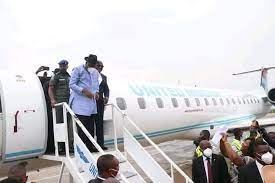There are palpable outrage in Bayelsa State over Governor Douye Diri’s frequent trips outside the state to woo fathom investors.
Niger Delta Herald investigations reveal that the Sampou born governor is out of the State for over three weeks with no official statement about his where about.
While some government sources hinted our correspondent in Yenagoa that the governor went to Australia to watch the final match of the Women World Cup (WWC) between England and Spain.
As at the time of filing this report the governor is yet to return to the state capital Yenagoa.
It would be recalled that the governor’s trip to watch the Men’s World Cup in Qatar sparked controversies as it claimed that he was invited by the world football governing body FIFA, which the opposition described as jamboree trip.
Similarly, a trip by the governor and some government officials to Greece to woo investors in the agricultural sector never yielded the expected result as the investors are yet to commence business in the state.
The Douye Diri administration also visited the United States Of America to woo investors, but that did not also yielded the objective.
Meanwhile, the opposition All Progress Congress (APC) have described the incessant trips by the governor as an avenue to divert funds meant for development under the guise of wooing foreign investors .
The chairman Dr. Dennis Otiotio faulted the governor ‘s investment drive adding that the governor has nothing on ground to attract investors.
Dr. Otiotio spoke to our correspondent in a telephone interview. According to him the Douye Diri led government only takes delight in embarking on jamboree trips because of the funds they want to divert.
A social analyst chief Adomokeme Brisibe express worries over the governor’s trip[s outside the state without transmitting power to his deputy.
He blame the State House of Assembly for not directing the activities of the executive, he stressing that the governor’s trips outside without official statement is an impeachable offence .
It would be recalled that Bayelsa State was among eight states that attract.
At least eight states failed to attract any foreign investments but piled up N194.09bn debt between 2019 and 2022, according to findings by Data from the Capital Importation reports of the National Bureau of Statistics revealed that Bayelsa, Gombe, Ebonyi, Jigawa, Kebbi, Taraba, Yobe and Zamfara did not attract any foreign investments to their states.
However, data from the Subnational Debt reports of the Debt Management Office showed that these states had a combined debt of N710.38bn in 2019.
By 2022, the combined debt of these eight states had risen to N904.47bn, showing a difference of N194.09bn.
The debt included domestic and external debts as recorded by the DMO under the reviewed period.
In 2019, while the eight states acquired a total domestic debt of N564.69bn, they had an external debt of $316.35m (N145.69bn using the exchange rate of the Central Bank of Nigeria, which was N460.53 per dollar as of April 19, 2023).
By 2022, these states’ domestic debt had risen significantly to N758.39bn while the external debt increased slightly to $317.21m (N146.08bn).
This shows that the states borrowed more from local creditors than international ones.
Further breakdown showed that the top domestic debtors in 2019 were Bayelsa (N147.93bn), Gombe (N84.01bn), and Taraba (N82.32bn).
By 2022, Bayelsa (N146.37bn) and Gombe (N139.32bn) remained top domestic debtors, while Zamfara (N122.2bn) unseated Taraba (N87.96bn).
For external debts, Ebonyi ($65.2m), Bayelsa ($59.55m) and Kebbi ($44.03m) took the lead in 2019.
By 2022, Bayelsa ($60.39m) overtook Ebonyi ($58.57m), while Taraba ($46.47m) overtook Kebbi ($40.93m).
In its December 2022 edition of the Nigeria Development Update, the World Bank noted that states’ debts would rise above 200 per cent of the revenue generated in 2022 and 2023.
The report read, “Debt levels for an average state are estimated to increase from 154.6 per cent of revenues in 2021 to above 200 per cent of revenues in both 2022 and 2023.”
According to the Washington-based bank, the increase in debts will be due to low allocation from the Federation Account, which will likely weaken the fiscal condition of the states.
The global lender had earlier said that Nigerian states would likely lose N18.8bn in oil and gas revenues in 2022, as worsening revenue collection at the federation level increases budgetary pressures for the states.
The World Bank also said foreign direct investment in Nigeria remained low because of limited forex availability, security concerns, and other structural challenges.
It said, “Net foreign direct investment and foreign portfolio investment flows into the Nigerian economy remain low, totaling only about 1 per cent of GDP.
“Net FDI inflows are negative, reflecting net withdrawals of equity by foreign investors. FDI and FPI flow into Nigeria do not compare favourably with similar economies of the world, reflecting difficulties with FX availability, security concerns, and other structural challenges in recent years.
“Low growth and slow structural transformation have contributed to this outcome — the pace of structural transformation of the domestic economy of the 2000s has not been sustained over a sufficiently long period.”
The Commissioner for Information, Orientation and strategy, Hon. Ayiba Duba and the Chief press secretary to the governor Mr.Daniel Alabrah could not be reached for comments as they fail to pick up their calls, when our correspondent called to get reaction about the governor’s trip.


